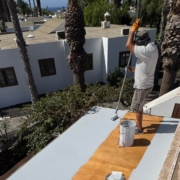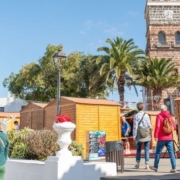In November last year a national survey showed that almost 60% of Spaniards felt “discouraged or pessimistic” about the cost of living, with 23% reporting feelings of depression or anxiety. The cost of living crisis may not be as acute as it was a year or two ago, but it remains a hugely pressing issue for most households.
The increasing cost of living is, of course, not just a problem here. Inflation rates soared two years ago after the end of the pandemic, and especially following Russia’s invasion of Ukraine. A Canarian consumer association has claimed that prices on the island rose by 30% between 2021 and 2023.
Prices have stabilised a little recently and inflation in Spain has been easing for some time. Last year it almost halved from around 6% in January 2023 to just over 3% in December. But that doesn’t mean that things are getting any cheaper.
If the cost-of-living crisis is a problem on mainland Spain, it is even more of one in the Canaries. The rate of inflation on the islands is around 4%, consistently higher than it is on the mainland, and the average price of a shopping basket is higher on the Canaries than in any other Spanish region.
Lanzarote has, historically, always been expensive. The average shopping basket has always been more expensive on Lanzarote than on most of the other Canary Islands, often exceeding prices on less-populated islands such as Fuerteventura and La Palma.
Last November a survey by Lanzarote Cabildo’s statistics unit found that housing and the cost of living were the two most important issues for Lanzarote islanders, and that 42% of those surveyed believed that life was worse than it had been a year earlier.
The financial problems aren’t helped by the fact that the Canaries, despite its thriving tourist economy, has the second-lowest average wages in Spain. Meanwhile, the record low interest rates that applied for over a decade are now in the past, and an ever-increasing number of mortgage holders are paying the price.
Other problems have also caused price increases. Last year saw potato prices shoot up after imports from the UK were briefly banned, and the price of olive oil – the main cooking medium used by Spaniards – has soared due to poor harvests.
The Canaries has advantages too, of course. The eye-watering heating bills that exist in the UK, Germany and other parts of Europe are not so much of an issue here, and certain products, such as bananas and fresh fish in season, can be extremely cheap. But the reliance of the islands on imported goods, which can be easily affected by transport costs, means they are extremely vulnerable to price fluctuations.
Lanzarote islanders have also been treated to low water prices for years, as successive governments have refused to raise prices despite the terrible state of the island’s water system. That, however, may not continue for much longer.
The fact remains that life has become more expensive for everyone on the islands and looks like remaining so for some time.
THE EFFECT ON TOURISM
It seems that the cost-of-living crisis in the UK has not diminished the desire to escape to the Lanzarote sunshine for a week or two.
While rising energy prices are believed to have been a main cause of a dip in German tourism, Lanzarote is now more popular than it has ever been among British and Irish visitors.
There are frequent complaints about the costs of flights and accommodation, of course, but these simply reflect demand, and demand is high. Other complaints arise when bars and restaurants alter their pricelists to reflect price rises, but again they have little choice in the matter.
Nevertheless, there has been an increase in the popularity of all-inclusive tourism, where holidaymakers know exactly how much they are likely to be paying for their holiday in advance. Fine for tourists, not so fine for the local small business owners who rely on tourist money.











Leave a Reply
Want to join the discussion?Feel free to contribute!